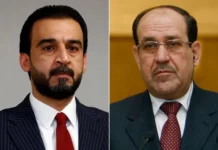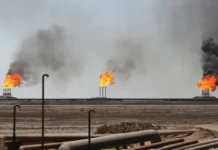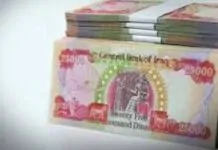The monetary master, Abdul Rahman Al Mashhadani, explained the date of the public authority’s retreat to revising the monetary spending plan.
Al-Mashhadani stated, ” In spite of the decrease in oil costs, Iraq doesn’t deal with an issue in the 2024 spending plan, as 8 months of the financial year have passed, and the circumstance is ordinary with oil costs transcending $70 per barrel.”
He added, “Likewise, the report gave by the Service of Money for the initial a half year had complete expenditure of 58 trillion dinars, while being 105 trillion dinars for the main portion of the year was assumed.”
Al-Mashhadani added, “The biggest piece of the spending was for functional costs, which added up to 53 trillion dinars, and 5 trillion for speculation costs, and the excess 4 months of the year can pass effectively and without issues, and compensations and wages are gotten thinking about that oil incomes cover the need.”
“Notwithstanding the public authority’s proceeded with presence of supporting implies that it has not yet utilized, for example, shortfall funding implies, which were wanted to be 64 trillion dinars shortage, with the National Bank contributing 22 trillion dinars of it, government banks covering 3 trillion and depository securities, notwithstanding the presence of 14 trillion dinars in spinning overflows, notwithstanding the presence of a lawful approval for the public authority to get locally to get its general spending plan, and this consolation is available in 2024,”
Al-Mashhadani called attention to that “assuming that costs proceed to decline and tumble to more significant levels coming to $55 per barrel or $60 in 2025, this will push the public authority to submit various information that will try to diminish venture consumptions as occurred in past emergencies and stop the speculation angle, which is presently considered to arrive at 45 trillion dinars.”
“The government will also focus on securing governing expenses such as salaries, wages, pensioners’ salaries, and the social protection network, which amounts to 90 trillion,” he continued. “In addition to reducing non-essential operating expenses such as commodity and service requirements, which are spent at 17 trillion dinars annually and were not spent in the first half of the year,”
Al-Mashhadani proceeded, “likewise, buying food bushel things, gas, and prescriptions for 10 trillion dinars, notwithstanding the premium and portions of the public obligation, which comprises of two sections, the basic piece of which is the outer obligation, which has diminished to 9 trillion, and accordingly the premium and portions that will be expected from government organizations, for example, the National Bank and government banks, and its installment can be deferred.”
He made sense of that “the overseeing costs of wages and oil creation expenses and this large number of costs will be around 145 trillion dinars, and this is the very thing will decide government spending,” taking note of that “in the event that the issue turns out to be more convoluted, the public authority can fall back on different strategies, for example, forcing charges on pay rates {the ostensible salary} just and not on the absolute on the grounds that the designations comprise 66% of the overall compensation.”





